Entrepreneurial Characteristics, Motivation, and Background Analysis
VerifiedAdded on 2021/02/21
|9
|2298
|110
Report
AI Summary
This report provides an in-depth analysis of entrepreneurship and small business management. It begins by defining entrepreneurship and its role in the economy, then explores the characteristics, traits, and skills of successful entrepreneurs, differentiating them from other business managers using examples like Bill Gates and Henry Ford. The report assesses how aspects of the entrepreneurial personality, based on the Big Five personality traits (openness, conscientiousness, extraversion, agreeableness, and neuroticism), reflect entrepreneurial motivation and mindset. It also examines how an entrepreneur's background and experience can either hinder or foster entrepreneurship, including factors like family background, lifestyle, and education. The report concludes by summarizing the importance of entrepreneurship and small businesses in economic growth and the impact of various factors on entrepreneurial success.

Entrepreneurship
and Small Business
Management
and Small Business
Management
Paraphrase This Document
Need a fresh take? Get an instant paraphrase of this document with our AI Paraphraser
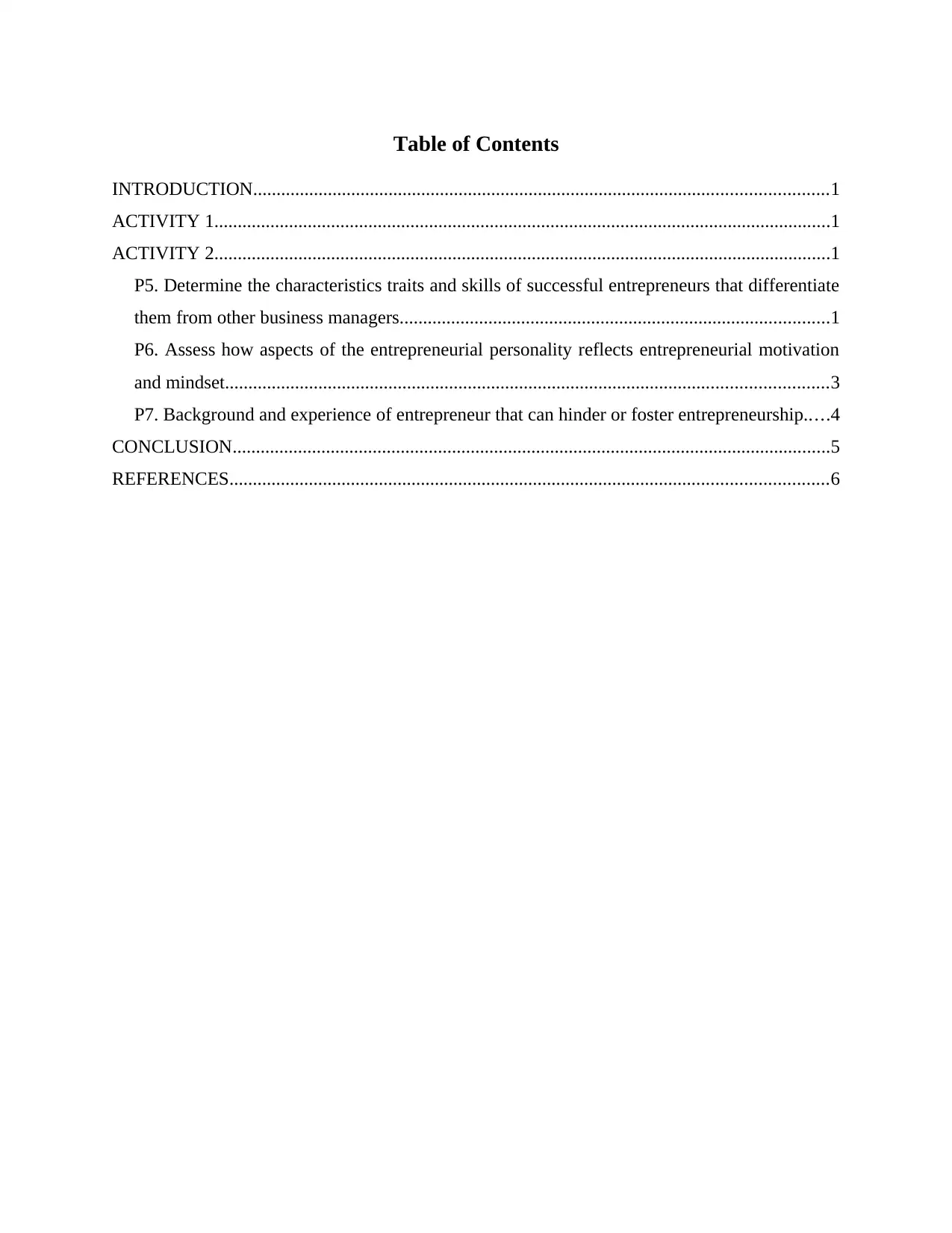
Table of Contents
INTRODUCTION...........................................................................................................................1
ACTIVITY 1....................................................................................................................................1
ACTIVITY 2....................................................................................................................................1
P5. Determine the characteristics traits and skills of successful entrepreneurs that differentiate
them from other business managers............................................................................................1
P6. Assess how aspects of the entrepreneurial personality reflects entrepreneurial motivation
and mindset.................................................................................................................................3
P7. Background and experience of entrepreneur that can hinder or foster entrepreneurship.....4
CONCLUSION................................................................................................................................5
REFERENCES................................................................................................................................6
INTRODUCTION...........................................................................................................................1
ACTIVITY 1....................................................................................................................................1
ACTIVITY 2....................................................................................................................................1
P5. Determine the characteristics traits and skills of successful entrepreneurs that differentiate
them from other business managers............................................................................................1
P6. Assess how aspects of the entrepreneurial personality reflects entrepreneurial motivation
and mindset.................................................................................................................................3
P7. Background and experience of entrepreneur that can hinder or foster entrepreneurship.....4
CONCLUSION................................................................................................................................5
REFERENCES................................................................................................................................6
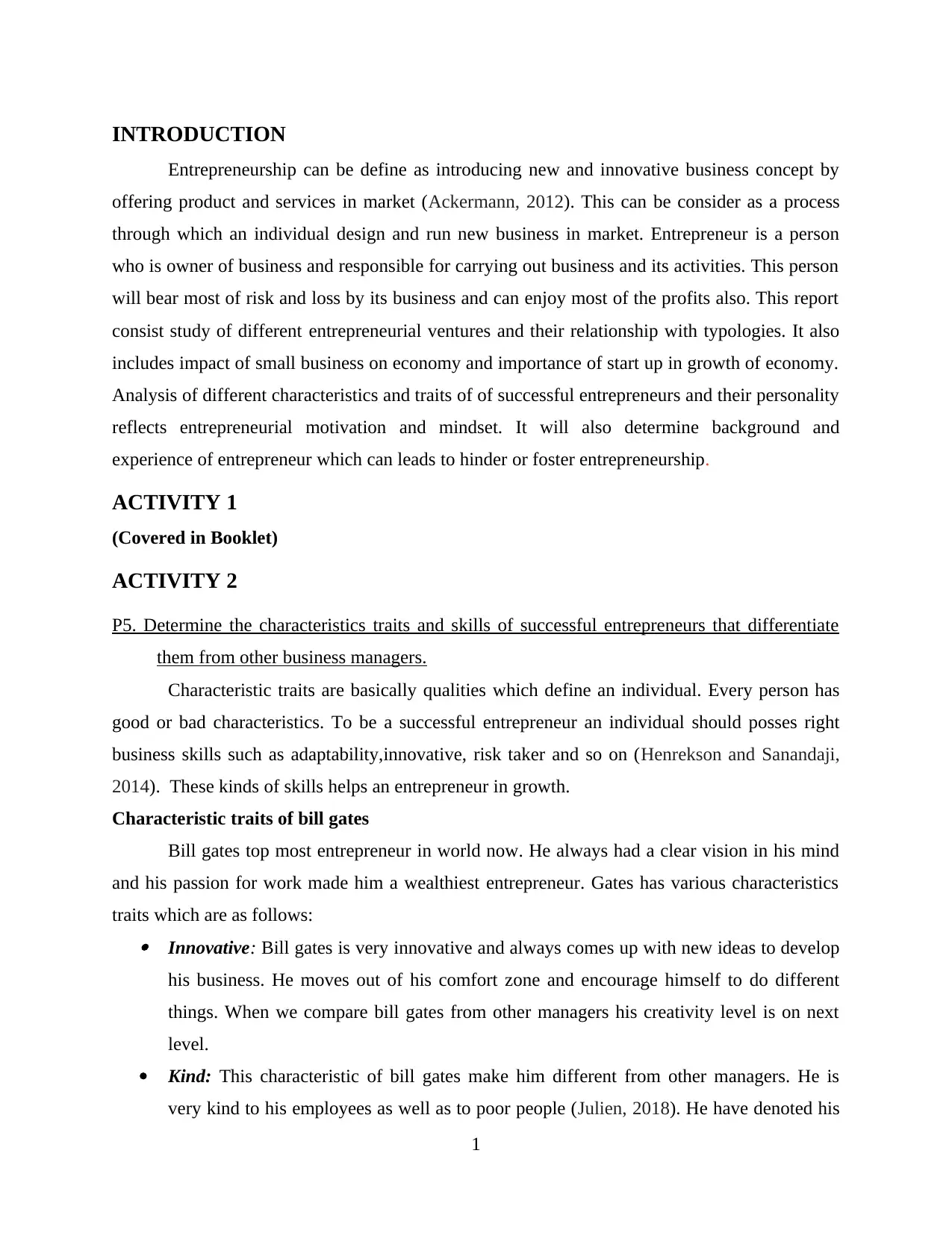
INTRODUCTION
Entrepreneurship can be define as introducing new and innovative business concept by
offering product and services in market (Ackermann, 2012). This can be consider as a process
through which an individual design and run new business in market. Entrepreneur is a person
who is owner of business and responsible for carrying out business and its activities. This person
will bear most of risk and loss by its business and can enjoy most of the profits also. This report
consist study of different entrepreneurial ventures and their relationship with typologies. It also
includes impact of small business on economy and importance of start up in growth of economy.
Analysis of different characteristics and traits of of successful entrepreneurs and their personality
reflects entrepreneurial motivation and mindset. It will also determine background and
experience of entrepreneur which can leads to hinder or foster entrepreneurship.
ACTIVITY 1
(Covered in Booklet)
ACTIVITY 2
P5. Determine the characteristics traits and skills of successful entrepreneurs that differentiate
them from other business managers.
Characteristic traits are basically qualities which define an individual. Every person has
good or bad characteristics. To be a successful entrepreneur an individual should posses right
business skills such as adaptability,innovative, risk taker and so on (Henrekson and Sanandaji,
2014). These kinds of skills helps an entrepreneur in growth.
Characteristic traits of bill gates
Bill gates top most entrepreneur in world now. He always had a clear vision in his mind
and his passion for work made him a wealthiest entrepreneur. Gates has various characteristics
traits which are as follows: Innovative: Bill gates is very innovative and always comes up with new ideas to develop
his business. He moves out of his comfort zone and encourage himself to do different
things. When we compare bill gates from other managers his creativity level is on next
level.
Kind: This characteristic of bill gates make him different from other managers. He is
very kind to his employees as well as to poor people (Julien, 2018). He have denoted his
1
Entrepreneurship can be define as introducing new and innovative business concept by
offering product and services in market (Ackermann, 2012). This can be consider as a process
through which an individual design and run new business in market. Entrepreneur is a person
who is owner of business and responsible for carrying out business and its activities. This person
will bear most of risk and loss by its business and can enjoy most of the profits also. This report
consist study of different entrepreneurial ventures and their relationship with typologies. It also
includes impact of small business on economy and importance of start up in growth of economy.
Analysis of different characteristics and traits of of successful entrepreneurs and their personality
reflects entrepreneurial motivation and mindset. It will also determine background and
experience of entrepreneur which can leads to hinder or foster entrepreneurship.
ACTIVITY 1
(Covered in Booklet)
ACTIVITY 2
P5. Determine the characteristics traits and skills of successful entrepreneurs that differentiate
them from other business managers.
Characteristic traits are basically qualities which define an individual. Every person has
good or bad characteristics. To be a successful entrepreneur an individual should posses right
business skills such as adaptability,innovative, risk taker and so on (Henrekson and Sanandaji,
2014). These kinds of skills helps an entrepreneur in growth.
Characteristic traits of bill gates
Bill gates top most entrepreneur in world now. He always had a clear vision in his mind
and his passion for work made him a wealthiest entrepreneur. Gates has various characteristics
traits which are as follows: Innovative: Bill gates is very innovative and always comes up with new ideas to develop
his business. He moves out of his comfort zone and encourage himself to do different
things. When we compare bill gates from other managers his creativity level is on next
level.
Kind: This characteristic of bill gates make him different from other managers. He is
very kind to his employees as well as to poor people (Julien, 2018). He have denoted his
1
⊘ This is a preview!⊘
Do you want full access?
Subscribe today to unlock all pages.

Trusted by 1+ million students worldwide
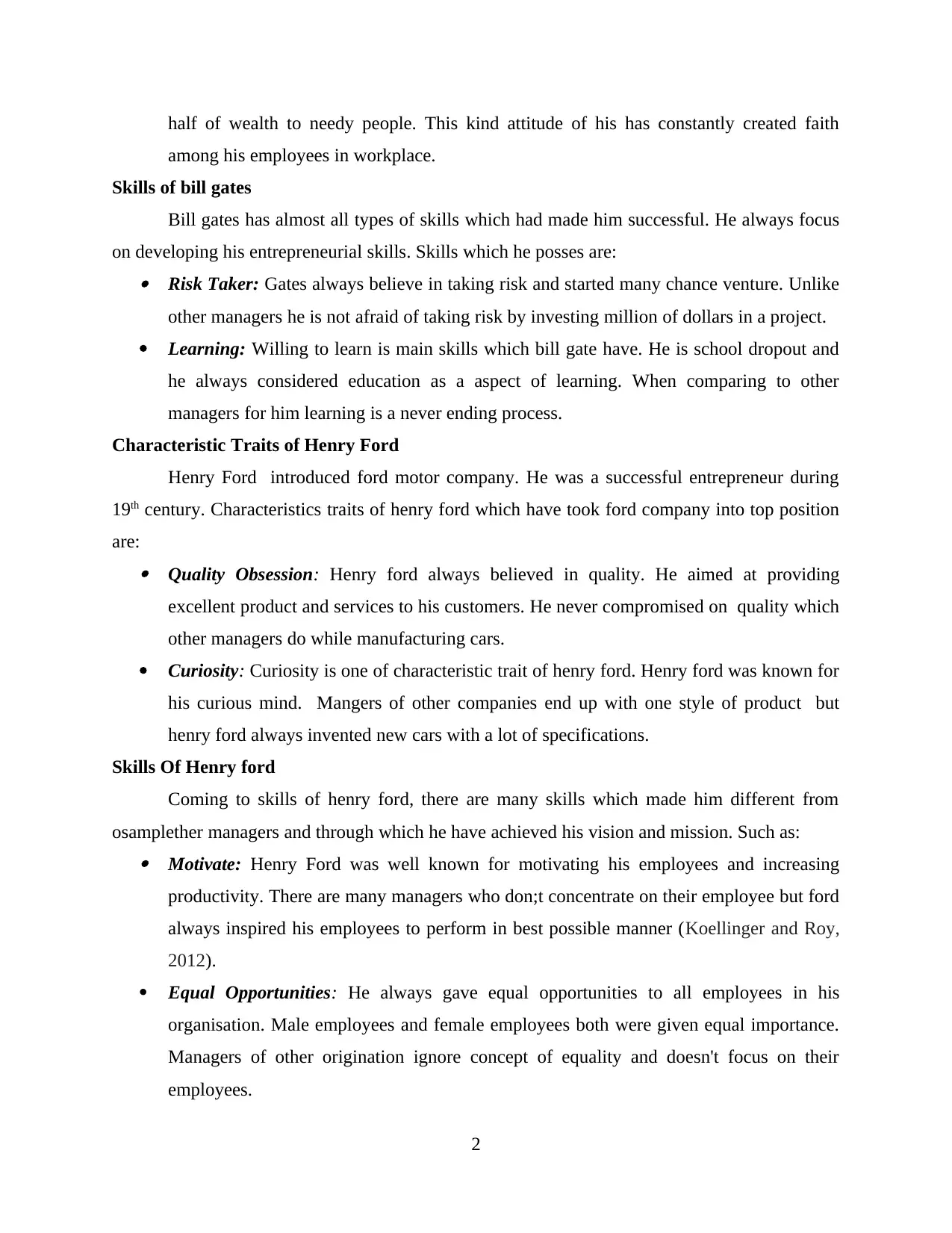
half of wealth to needy people. This kind attitude of his has constantly created faith
among his employees in workplace.
Skills of bill gates
Bill gates has almost all types of skills which had made him successful. He always focus
on developing his entrepreneurial skills. Skills which he posses are: Risk Taker: Gates always believe in taking risk and started many chance venture. Unlike
other managers he is not afraid of taking risk by investing million of dollars in a project.
Learning: Willing to learn is main skills which bill gate have. He is school dropout and
he always considered education as a aspect of learning. When comparing to other
managers for him learning is a never ending process.
Characteristic Traits of Henry Ford
Henry Ford introduced ford motor company. He was a successful entrepreneur during
19th century. Characteristics traits of henry ford which have took ford company into top position
are: Quality Obsession: Henry ford always believed in quality. He aimed at providing
excellent product and services to his customers. He never compromised on quality which
other managers do while manufacturing cars.
Curiosity: Curiosity is one of characteristic trait of henry ford. Henry ford was known for
his curious mind. Mangers of other companies end up with one style of product but
henry ford always invented new cars with a lot of specifications.
Skills Of Henry ford
Coming to skills of henry ford, there are many skills which made him different from
osamplether managers and through which he have achieved his vision and mission. Such as: Motivate: Henry Ford was well known for motivating his employees and increasing
productivity. There are many managers who don;t concentrate on their employee but ford
always inspired his employees to perform in best possible manner (Koellinger and Roy,
2012).
Equal Opportunities: He always gave equal opportunities to all employees in his
organisation. Male employees and female employees both were given equal importance.
Managers of other origination ignore concept of equality and doesn't focus on their
employees.
2
among his employees in workplace.
Skills of bill gates
Bill gates has almost all types of skills which had made him successful. He always focus
on developing his entrepreneurial skills. Skills which he posses are: Risk Taker: Gates always believe in taking risk and started many chance venture. Unlike
other managers he is not afraid of taking risk by investing million of dollars in a project.
Learning: Willing to learn is main skills which bill gate have. He is school dropout and
he always considered education as a aspect of learning. When comparing to other
managers for him learning is a never ending process.
Characteristic Traits of Henry Ford
Henry Ford introduced ford motor company. He was a successful entrepreneur during
19th century. Characteristics traits of henry ford which have took ford company into top position
are: Quality Obsession: Henry ford always believed in quality. He aimed at providing
excellent product and services to his customers. He never compromised on quality which
other managers do while manufacturing cars.
Curiosity: Curiosity is one of characteristic trait of henry ford. Henry ford was known for
his curious mind. Mangers of other companies end up with one style of product but
henry ford always invented new cars with a lot of specifications.
Skills Of Henry ford
Coming to skills of henry ford, there are many skills which made him different from
osamplether managers and through which he have achieved his vision and mission. Such as: Motivate: Henry Ford was well known for motivating his employees and increasing
productivity. There are many managers who don;t concentrate on their employee but ford
always inspired his employees to perform in best possible manner (Koellinger and Roy,
2012).
Equal Opportunities: He always gave equal opportunities to all employees in his
organisation. Male employees and female employees both were given equal importance.
Managers of other origination ignore concept of equality and doesn't focus on their
employees.
2
Paraphrase This Document
Need a fresh take? Get an instant paraphrase of this document with our AI Paraphraser
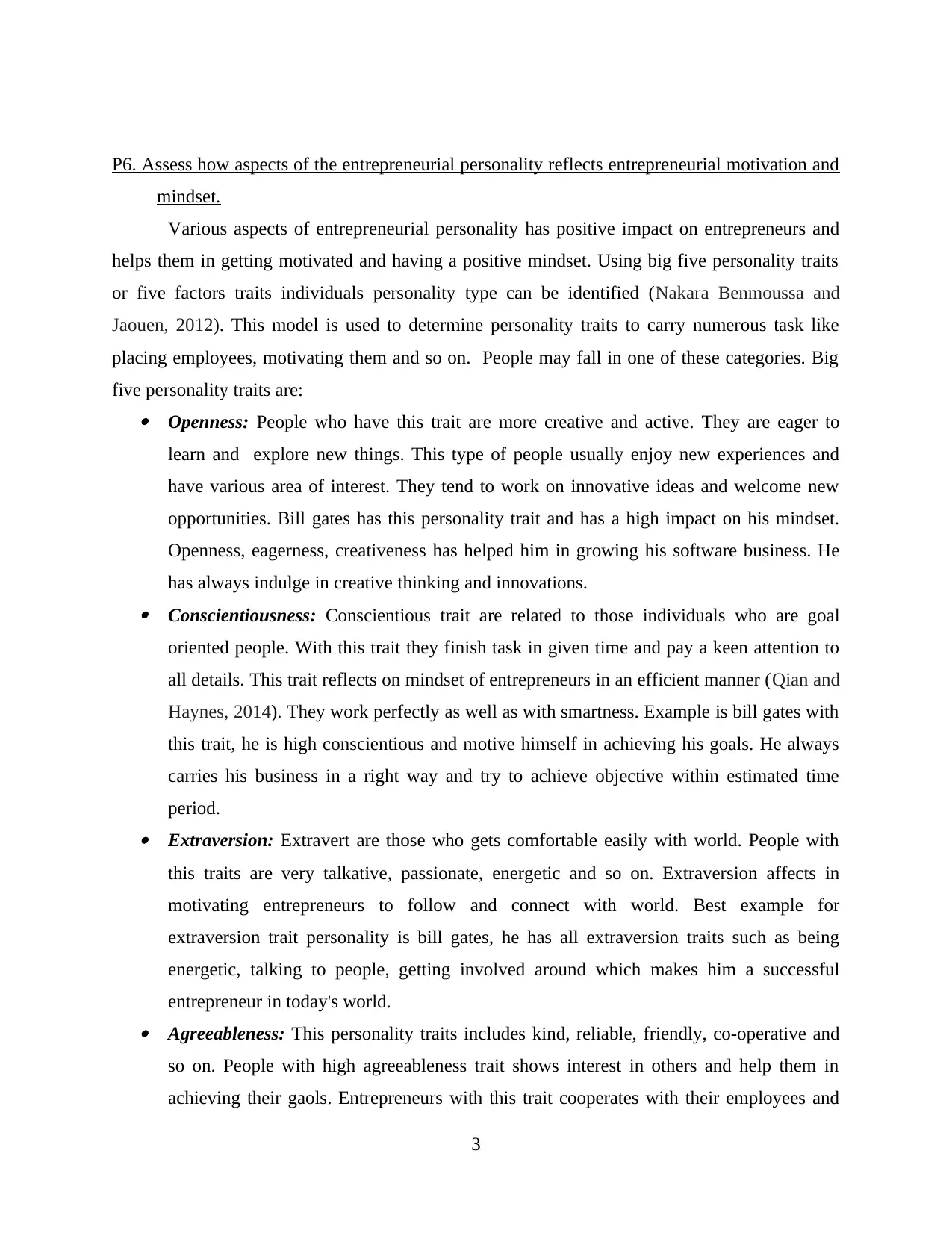
P6. Assess how aspects of the entrepreneurial personality reflects entrepreneurial motivation and
mindset.
Various aspects of entrepreneurial personality has positive impact on entrepreneurs and
helps them in getting motivated and having a positive mindset. Using big five personality traits
or five factors traits individuals personality type can be identified (Nakara Benmoussa and
Jaouen, 2012). This model is used to determine personality traits to carry numerous task like
placing employees, motivating them and so on. People may fall in one of these categories. Big
five personality traits are: Openness: People who have this trait are more creative and active. They are eager to
learn and explore new things. This type of people usually enjoy new experiences and
have various area of interest. They tend to work on innovative ideas and welcome new
opportunities. Bill gates has this personality trait and has a high impact on his mindset.
Openness, eagerness, creativeness has helped him in growing his software business. He
has always indulge in creative thinking and innovations. Conscientiousness: Conscientious trait are related to those individuals who are goal
oriented people. With this trait they finish task in given time and pay a keen attention to
all details. This trait reflects on mindset of entrepreneurs in an efficient manner (Qian and
Haynes, 2014). They work perfectly as well as with smartness. Example is bill gates with
this trait, he is high conscientious and motive himself in achieving his goals. He always
carries his business in a right way and try to achieve objective within estimated time
period. Extraversion: Extravert are those who gets comfortable easily with world. People with
this traits are very talkative, passionate, energetic and so on. Extraversion affects in
motivating entrepreneurs to follow and connect with world. Best example for
extraversion trait personality is bill gates, he has all extraversion traits such as being
energetic, talking to people, getting involved around which makes him a successful
entrepreneur in today's world. Agreeableness: This personality traits includes kind, reliable, friendly, co-operative and
so on. People with high agreeableness trait shows interest in others and help them in
achieving their gaols. Entrepreneurs with this trait cooperates with their employees and
3
mindset.
Various aspects of entrepreneurial personality has positive impact on entrepreneurs and
helps them in getting motivated and having a positive mindset. Using big five personality traits
or five factors traits individuals personality type can be identified (Nakara Benmoussa and
Jaouen, 2012). This model is used to determine personality traits to carry numerous task like
placing employees, motivating them and so on. People may fall in one of these categories. Big
five personality traits are: Openness: People who have this trait are more creative and active. They are eager to
learn and explore new things. This type of people usually enjoy new experiences and
have various area of interest. They tend to work on innovative ideas and welcome new
opportunities. Bill gates has this personality trait and has a high impact on his mindset.
Openness, eagerness, creativeness has helped him in growing his software business. He
has always indulge in creative thinking and innovations. Conscientiousness: Conscientious trait are related to those individuals who are goal
oriented people. With this trait they finish task in given time and pay a keen attention to
all details. This trait reflects on mindset of entrepreneurs in an efficient manner (Qian and
Haynes, 2014). They work perfectly as well as with smartness. Example is bill gates with
this trait, he is high conscientious and motive himself in achieving his goals. He always
carries his business in a right way and try to achieve objective within estimated time
period. Extraversion: Extravert are those who gets comfortable easily with world. People with
this traits are very talkative, passionate, energetic and so on. Extraversion affects in
motivating entrepreneurs to follow and connect with world. Best example for
extraversion trait personality is bill gates, he has all extraversion traits such as being
energetic, talking to people, getting involved around which makes him a successful
entrepreneur in today's world. Agreeableness: This personality traits includes kind, reliable, friendly, co-operative and
so on. People with high agreeableness trait shows interest in others and help them in
achieving their gaols. Entrepreneurs with this trait cooperates with their employees and
3
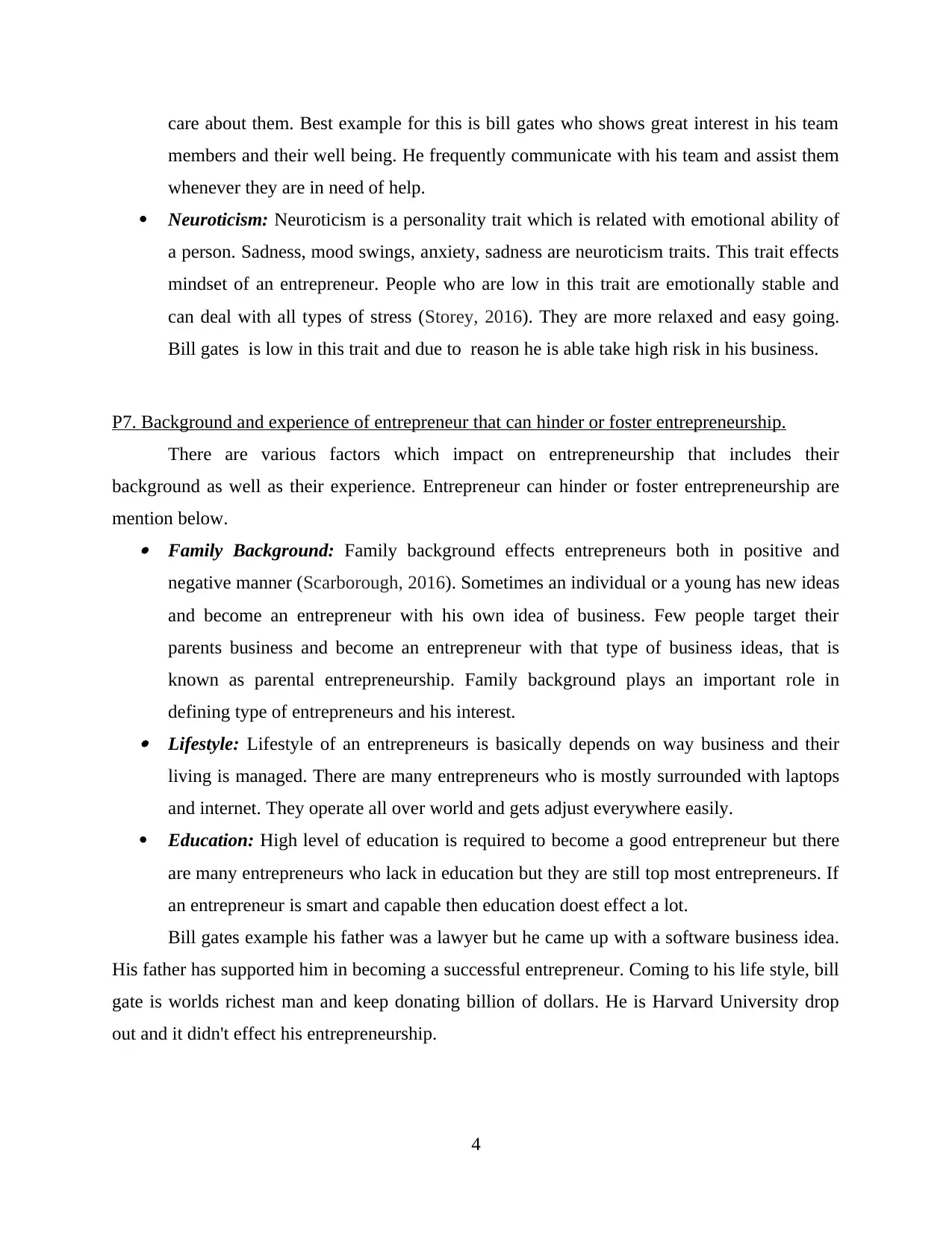
care about them. Best example for this is bill gates who shows great interest in his team
members and their well being. He frequently communicate with his team and assist them
whenever they are in need of help.
Neuroticism: Neuroticism is a personality trait which is related with emotional ability of
a person. Sadness, mood swings, anxiety, sadness are neuroticism traits. This trait effects
mindset of an entrepreneur. People who are low in this trait are emotionally stable and
can deal with all types of stress (Storey, 2016). They are more relaxed and easy going.
Bill gates is low in this trait and due to reason he is able take high risk in his business.
P7. Background and experience of entrepreneur that can hinder or foster entrepreneurship.
There are various factors which impact on entrepreneurship that includes their
background as well as their experience. Entrepreneur can hinder or foster entrepreneurship are
mention below. Family Background: Family background effects entrepreneurs both in positive and
negative manner (Scarborough, 2016). Sometimes an individual or a young has new ideas
and become an entrepreneur with his own idea of business. Few people target their
parents business and become an entrepreneur with that type of business ideas, that is
known as parental entrepreneurship. Family background plays an important role in
defining type of entrepreneurs and his interest. Lifestyle: Lifestyle of an entrepreneurs is basically depends on way business and their
living is managed. There are many entrepreneurs who is mostly surrounded with laptops
and internet. They operate all over world and gets adjust everywhere easily.
Education: High level of education is required to become a good entrepreneur but there
are many entrepreneurs who lack in education but they are still top most entrepreneurs. If
an entrepreneur is smart and capable then education doest effect a lot.
Bill gates example his father was a lawyer but he came up with a software business idea.
His father has supported him in becoming a successful entrepreneur. Coming to his life style, bill
gate is worlds richest man and keep donating billion of dollars. He is Harvard University drop
out and it didn't effect his entrepreneurship.
4
members and their well being. He frequently communicate with his team and assist them
whenever they are in need of help.
Neuroticism: Neuroticism is a personality trait which is related with emotional ability of
a person. Sadness, mood swings, anxiety, sadness are neuroticism traits. This trait effects
mindset of an entrepreneur. People who are low in this trait are emotionally stable and
can deal with all types of stress (Storey, 2016). They are more relaxed and easy going.
Bill gates is low in this trait and due to reason he is able take high risk in his business.
P7. Background and experience of entrepreneur that can hinder or foster entrepreneurship.
There are various factors which impact on entrepreneurship that includes their
background as well as their experience. Entrepreneur can hinder or foster entrepreneurship are
mention below. Family Background: Family background effects entrepreneurs both in positive and
negative manner (Scarborough, 2016). Sometimes an individual or a young has new ideas
and become an entrepreneur with his own idea of business. Few people target their
parents business and become an entrepreneur with that type of business ideas, that is
known as parental entrepreneurship. Family background plays an important role in
defining type of entrepreneurs and his interest. Lifestyle: Lifestyle of an entrepreneurs is basically depends on way business and their
living is managed. There are many entrepreneurs who is mostly surrounded with laptops
and internet. They operate all over world and gets adjust everywhere easily.
Education: High level of education is required to become a good entrepreneur but there
are many entrepreneurs who lack in education but they are still top most entrepreneurs. If
an entrepreneur is smart and capable then education doest effect a lot.
Bill gates example his father was a lawyer but he came up with a software business idea.
His father has supported him in becoming a successful entrepreneur. Coming to his life style, bill
gate is worlds richest man and keep donating billion of dollars. He is Harvard University drop
out and it didn't effect his entrepreneurship.
4
⊘ This is a preview!⊘
Do you want full access?
Subscribe today to unlock all pages.

Trusted by 1+ million students worldwide
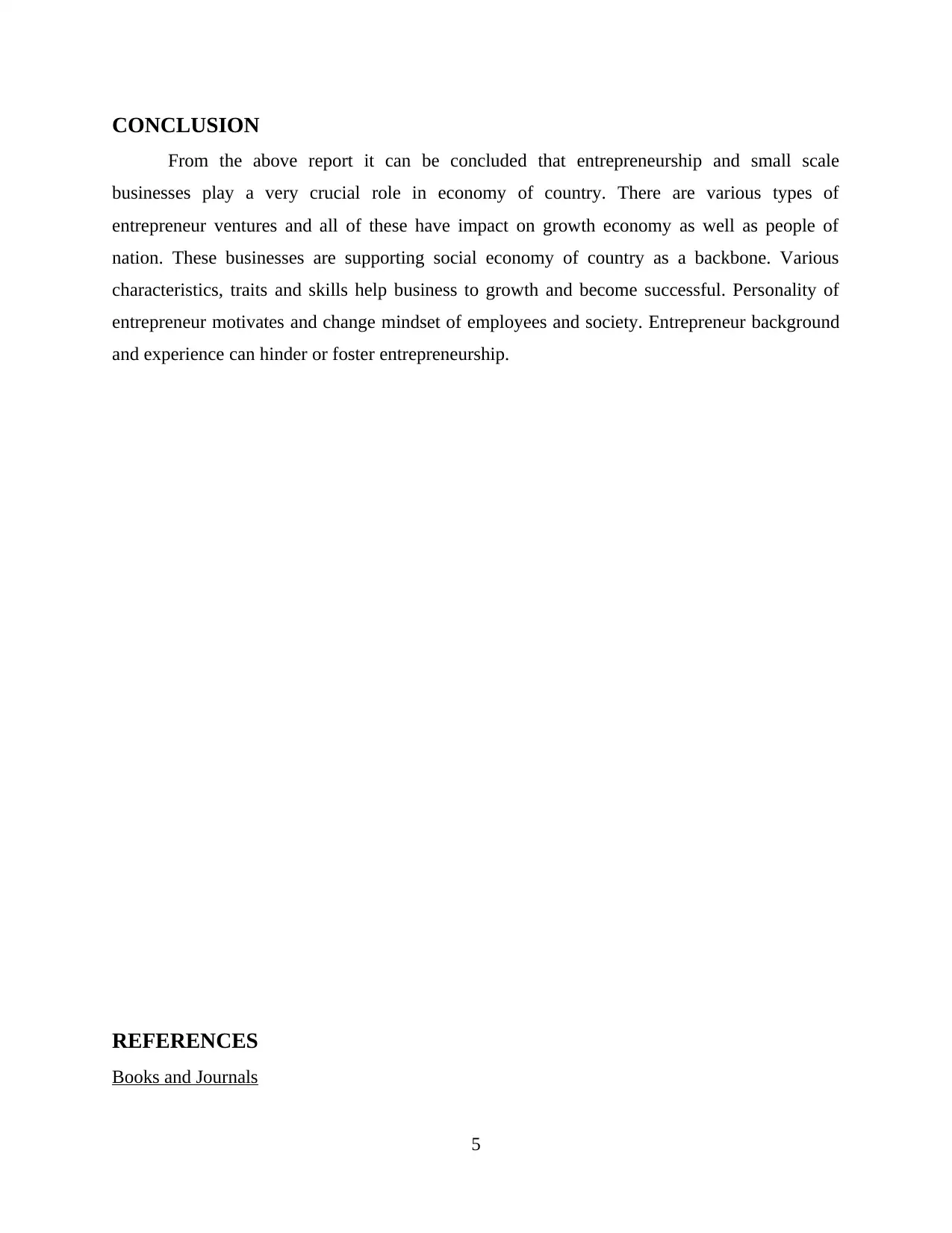
CONCLUSION
From the above report it can be concluded that entrepreneurship and small scale
businesses play a very crucial role in economy of country. There are various types of
entrepreneur ventures and all of these have impact on growth economy as well as people of
nation. These businesses are supporting social economy of country as a backbone. Various
characteristics, traits and skills help business to growth and become successful. Personality of
entrepreneur motivates and change mindset of employees and society. Entrepreneur background
and experience can hinder or foster entrepreneurship.
REFERENCES
Books and Journals
5
From the above report it can be concluded that entrepreneurship and small scale
businesses play a very crucial role in economy of country. There are various types of
entrepreneur ventures and all of these have impact on growth economy as well as people of
nation. These businesses are supporting social economy of country as a backbone. Various
characteristics, traits and skills help business to growth and become successful. Personality of
entrepreneur motivates and change mindset of employees and society. Entrepreneur background
and experience can hinder or foster entrepreneurship.
REFERENCES
Books and Journals
5
Paraphrase This Document
Need a fresh take? Get an instant paraphrase of this document with our AI Paraphraser
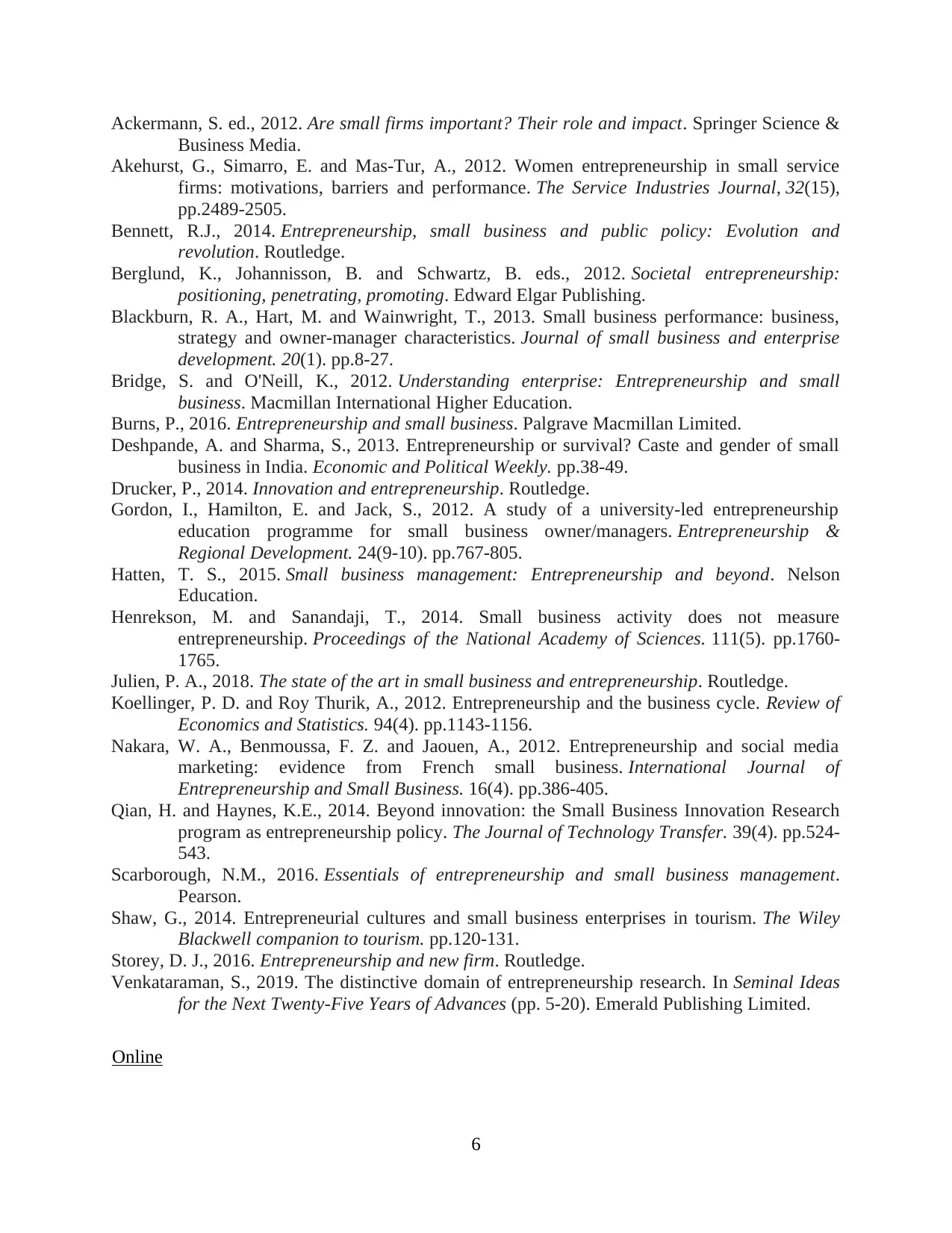
Ackermann, S. ed., 2012. Are small firms important? Their role and impact. Springer Science &
Business Media.
Akehurst, G., Simarro, E. and Mas‐Tur, A., 2012. Women entrepreneurship in small service
firms: motivations, barriers and performance. The Service Industries Journal, 32(15),
pp.2489-2505.
Bennett, R.J., 2014. Entrepreneurship, small business and public policy: Evolution and
revolution. Routledge.
Berglund, K., Johannisson, B. and Schwartz, B. eds., 2012. Societal entrepreneurship:
positioning, penetrating, promoting. Edward Elgar Publishing.
Blackburn, R. A., Hart, M. and Wainwright, T., 2013. Small business performance: business,
strategy and owner-manager characteristics. Journal of small business and enterprise
development. 20(1). pp.8-27.
Bridge, S. and O'Neill, K., 2012. Understanding enterprise: Entrepreneurship and small
business. Macmillan International Higher Education.
Burns, P., 2016. Entrepreneurship and small business. Palgrave Macmillan Limited.
Deshpande, A. and Sharma, S., 2013. Entrepreneurship or survival? Caste and gender of small
business in India. Economic and Political Weekly. pp.38-49.
Drucker, P., 2014. Innovation and entrepreneurship. Routledge.
Gordon, I., Hamilton, E. and Jack, S., 2012. A study of a university-led entrepreneurship
education programme for small business owner/managers. Entrepreneurship &
Regional Development. 24(9-10). pp.767-805.
Hatten, T. S., 2015. Small business management: Entrepreneurship and beyond. Nelson
Education.
Henrekson, M. and Sanandaji, T., 2014. Small business activity does not measure
entrepreneurship. Proceedings of the National Academy of Sciences. 111(5). pp.1760-
1765.
Julien, P. A., 2018. The state of the art in small business and entrepreneurship. Routledge.
Koellinger, P. D. and Roy Thurik, A., 2012. Entrepreneurship and the business cycle. Review of
Economics and Statistics. 94(4). pp.1143-1156.
Nakara, W. A., Benmoussa, F. Z. and Jaouen, A., 2012. Entrepreneurship and social media
marketing: evidence from French small business. International Journal of
Entrepreneurship and Small Business. 16(4). pp.386-405.
Qian, H. and Haynes, K.E., 2014. Beyond innovation: the Small Business Innovation Research
program as entrepreneurship policy. The Journal of Technology Transfer. 39(4). pp.524-
543.
Scarborough, N.M., 2016. Essentials of entrepreneurship and small business management.
Pearson.
Shaw, G., 2014. Entrepreneurial cultures and small business enterprises in tourism. The Wiley
Blackwell companion to tourism. pp.120-131.
Storey, D. J., 2016. Entrepreneurship and new firm. Routledge.
Venkataraman, S., 2019. The distinctive domain of entrepreneurship research. In Seminal Ideas
for the Next Twenty-Five Years of Advances (pp. 5-20). Emerald Publishing Limited.
Online
6
Business Media.
Akehurst, G., Simarro, E. and Mas‐Tur, A., 2012. Women entrepreneurship in small service
firms: motivations, barriers and performance. The Service Industries Journal, 32(15),
pp.2489-2505.
Bennett, R.J., 2014. Entrepreneurship, small business and public policy: Evolution and
revolution. Routledge.
Berglund, K., Johannisson, B. and Schwartz, B. eds., 2012. Societal entrepreneurship:
positioning, penetrating, promoting. Edward Elgar Publishing.
Blackburn, R. A., Hart, M. and Wainwright, T., 2013. Small business performance: business,
strategy and owner-manager characteristics. Journal of small business and enterprise
development. 20(1). pp.8-27.
Bridge, S. and O'Neill, K., 2012. Understanding enterprise: Entrepreneurship and small
business. Macmillan International Higher Education.
Burns, P., 2016. Entrepreneurship and small business. Palgrave Macmillan Limited.
Deshpande, A. and Sharma, S., 2013. Entrepreneurship or survival? Caste and gender of small
business in India. Economic and Political Weekly. pp.38-49.
Drucker, P., 2014. Innovation and entrepreneurship. Routledge.
Gordon, I., Hamilton, E. and Jack, S., 2012. A study of a university-led entrepreneurship
education programme for small business owner/managers. Entrepreneurship &
Regional Development. 24(9-10). pp.767-805.
Hatten, T. S., 2015. Small business management: Entrepreneurship and beyond. Nelson
Education.
Henrekson, M. and Sanandaji, T., 2014. Small business activity does not measure
entrepreneurship. Proceedings of the National Academy of Sciences. 111(5). pp.1760-
1765.
Julien, P. A., 2018. The state of the art in small business and entrepreneurship. Routledge.
Koellinger, P. D. and Roy Thurik, A., 2012. Entrepreneurship and the business cycle. Review of
Economics and Statistics. 94(4). pp.1143-1156.
Nakara, W. A., Benmoussa, F. Z. and Jaouen, A., 2012. Entrepreneurship and social media
marketing: evidence from French small business. International Journal of
Entrepreneurship and Small Business. 16(4). pp.386-405.
Qian, H. and Haynes, K.E., 2014. Beyond innovation: the Small Business Innovation Research
program as entrepreneurship policy. The Journal of Technology Transfer. 39(4). pp.524-
543.
Scarborough, N.M., 2016. Essentials of entrepreneurship and small business management.
Pearson.
Shaw, G., 2014. Entrepreneurial cultures and small business enterprises in tourism. The Wiley
Blackwell companion to tourism. pp.120-131.
Storey, D. J., 2016. Entrepreneurship and new firm. Routledge.
Venkataraman, S., 2019. The distinctive domain of entrepreneurship research. In Seminal Ideas
for the Next Twenty-Five Years of Advances (pp. 5-20). Emerald Publishing Limited.
Online
6

Brexit’s impact on small businesses: the experts may be spot on after all. 2019. [Online].
Available through<https://theconversation.com/brexits-impact-on-small-businesses-the-
experts-may-be-spot-on-after-all-90561>.
7
Available through<https://theconversation.com/brexits-impact-on-small-businesses-the-
experts-may-be-spot-on-after-all-90561>.
7
⊘ This is a preview!⊘
Do you want full access?
Subscribe today to unlock all pages.

Trusted by 1+ million students worldwide
1 out of 9
Related Documents
Your All-in-One AI-Powered Toolkit for Academic Success.
+13062052269
info@desklib.com
Available 24*7 on WhatsApp / Email
![[object Object]](/_next/static/media/star-bottom.7253800d.svg)
Unlock your academic potential
Copyright © 2020–2025 A2Z Services. All Rights Reserved. Developed and managed by ZUCOL.





